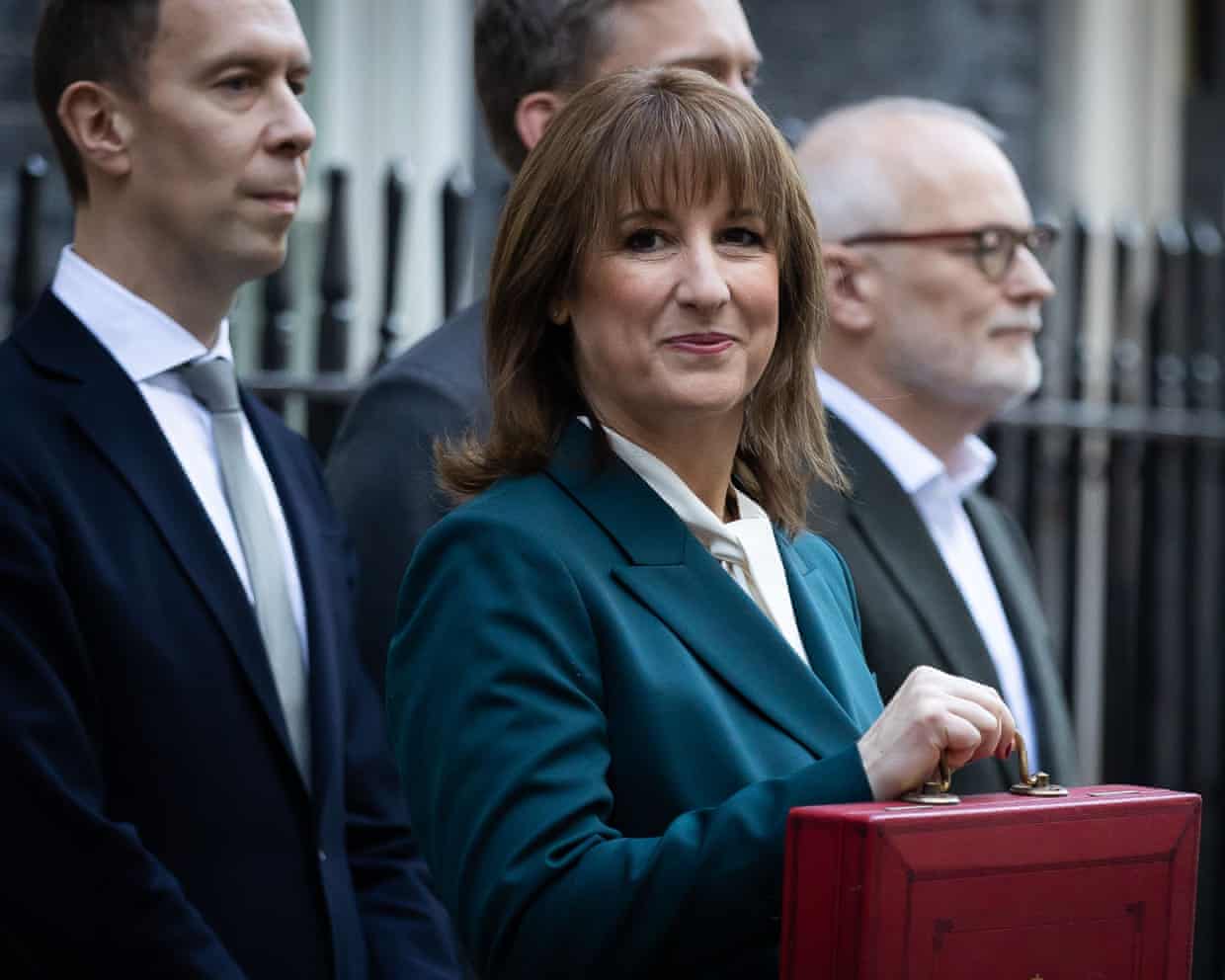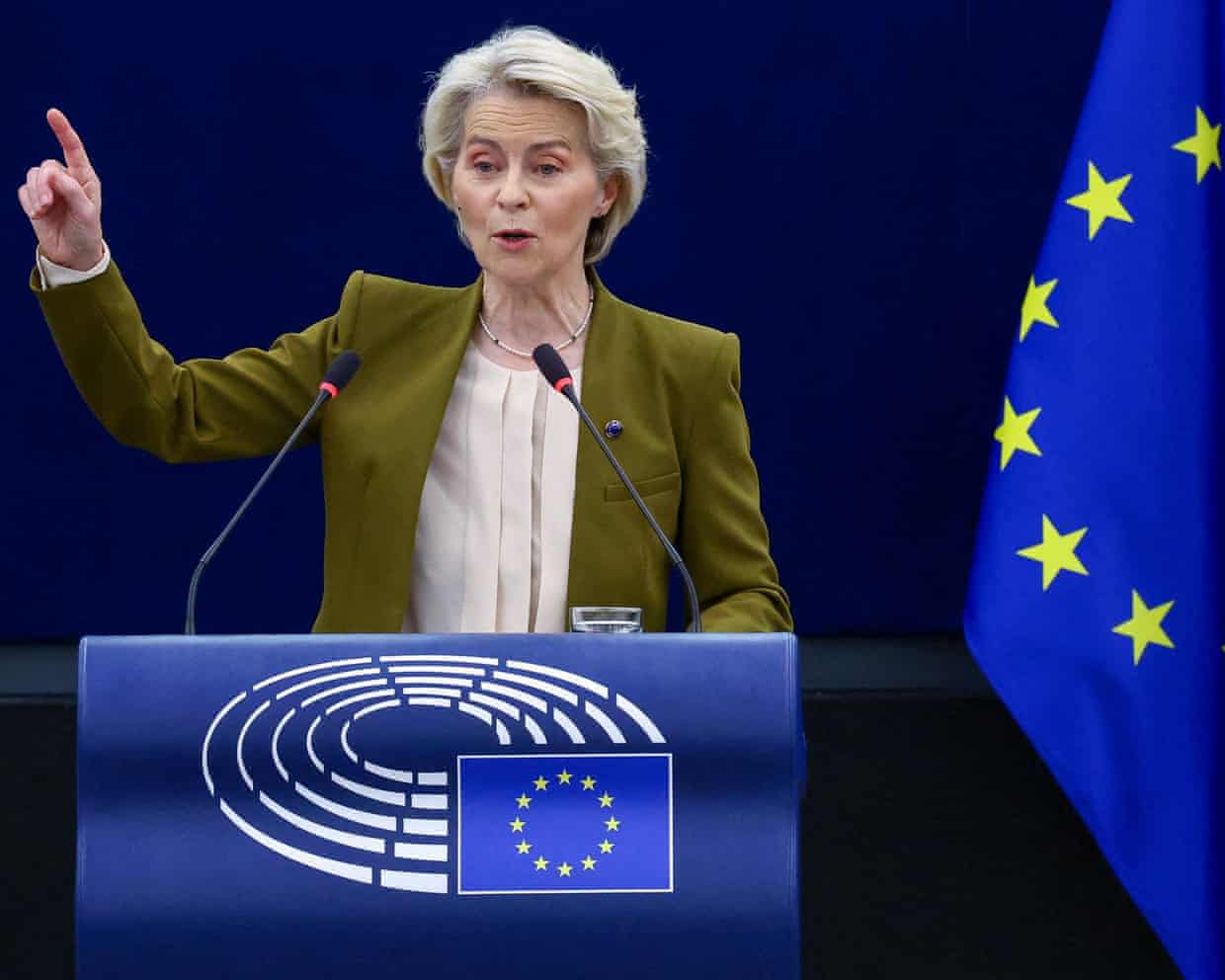Economists warn budget built on ‘shaky foundations’; December UK interest rate cut looks more likely – as it happened
Some UK bond yields are now moving a little higher, as the City continues to analyse the budget.The yield (or interest rate) on 10-year gilts has gained four basis points to 4.46% today, which erodes around half of the recovery in yields yesterday.Investors will have noted that while the spending increases in the budget happen quite soon, the tax rises are more back-loaded.As City firm TS Lombard put it:Tightening is mostly kicked into the back-end of the forecast period, with policy actually adding to borrowing in the next few years.
The UK is left with a bigger state funded by higher taxes, while fiscal headroom and debt dynamics remain fragile.French bank BNP Paribas warn the budget could be “built on shaky foundations”, and question whether the government would really push through tax rises close to the next election.They say:Whether by luck or judgement, the budget delivered a policy mix that is likely to appease the parliamentary Labour party, voters, and even the market – at least for now.This is because the fundamentals of it came broadly in line with market expectations, giveaways on welfare spending and avoidance of a manifesto breach should quell fears of rebellion within the party, and voters are likely to feel the positive impact of lower energy bills.That said, questions around the credibility of the measures remain, particularly around their backloaded timing – which happens to coincide with the next general election – and the government’s ability to deliver them.
And finally…some measure of UK borrowing costs rose today, but it was a minor move after yesterday’s post-Budget bond rally,The yield, or interest rate, on 10-year UK gilts has gained 3 basis points (0,03 percentage points) to 4,45%, as City investors have questioned the credibility of the fiscal plans outlined by the chancellor,Long-dated 30-year gilt yields dipped very slightly, while there was a small rise in short-dated two and five-year bond yields.
But the City is confident that the Bank of England will lower interest rates next month – a December rate cut, from 4% to 3.75%, is seen as a 92% chance tonight.Rachel Reeves has positioned Labour to fight the next general election with tax increases and spending cuts that resemble a work of “fiscal fiction”, an analysis by leading economists has warned.In its verdict on the chancellor’s budget, the Institute for Fiscal Studies (IFS) said the chancellor had chosen a high-risk strategy by backloading her plans to start just before voters go the polls in 2029.Helen Miller, the thinktank’s director, said the budget plans would involve “near-heroic restraint in an election year” and suggested that Labour may ultimately be forced to abandon some of its tax-raising measures or planned spending cuts.
“[It is] a backloaded set of tax rises that almost entirely delay the pain.It’s reminiscent of the fiscal fictions of recent years.I hope this is a government able to deliver on its plans.But I have my doubts,” she said.The London stock market has closed, with the blue-chip share index little changed on the day.
The FTSE 100 index has gaind 2,35 points today, or 0,02%, to end at 9693 points,Housebuilders were among the risers, lifted by hopes of UK interest rate cuts, while banks had another good day after avoiding a windfall tax in yesterday’s budget,Consultancy Oxford Economics has also warned that the budget has not restored the UK’s fiscal credibility.
They fear that this could lead to a ‘slow burn’ increase in long-term borrowing costs, and a weaker currency:Despite expectations of a large consolidation, the backloaded nature of the measures and lack of spending restraint means questions around the UK’s long term fiscal credibility will continue,We anticipate a slow burn rise in term premia and a falling pound,That could be precipitated at any moment by fiscal slippage, unmet expectations for productivity improvement, or faltering growth, leading to a rolling confidence crisis in UK safe assets and sterling,UK retailers are urging the government to move faster to close a loophole used by low-cost platforms such as Shein and Temu,In the budget, Rachel Reeves said the UK would end a customs waiver on parcels worth less than £135.
The chance is expected by March 2029.But Helen Dickinson, chief executive of the British Retail Consortium trade body, said the proposed time frame is “simply too long”, adding:“Businesses cannot afford any delay.”Away from the budget, lenders have been warned that the parent company of the Daily Mail’s lack of financial scale means it would face a downgrade if it looked to take on a significant amount of debt to fund its £500m takeover of the Telegraph titles, according to a note by S&P Global Ratings.The US credit ratings agency said that Rothermere Continuation Holdings Ltd (RCHL) - the Jersey-based parent company of Lord Rothermere’s assets including the Daily Mail, Mail on Sunday, Metro and The i Paper - has been put on “CreditWatch” as it seeks to put a funding package in place to table a formal deal in the coming weeks.S&P analysts said in the note:“The detail and funding of the transaction remain unclear but, in our view RCHL has limited headroom under our BB- long-term issuer credit rating to accommodate any additional financial debt, considering its limited size and the fact that Telegraph Media Group (TMG) operates in structurally challenged newsprint and advertising markets.
”The note said that given the significant valuation of TMG at £500m, compared with RCHL’s “modest size and scale”, S&P believes that the transaction might “materially increase its adjusted leverage beyond our threshold”.On Saturday, Lord Rothermere’s Daily Mail & General Trust (DMGT) announced a £500m deal with RedBird IMI to buy the Telegraph titles.The two parties have entered a period of exclusivity and aim to complete the terms of the transaction swiftly, however there is significant speculation over how Rothermere will fund the deal.Most analysts believe that the Telegraph titles are worth around £350m, and DMGT has said that in order to comply with foreign state influence rules there will be no foreign state investment or capital in its funding structure.However, some observers have speculated that this could still leave open the possibility of funding from foreign sources that are not state-owned or sovereign wealth funds.
Two years ago DMGT had been in talks with Qatari investors about backing a bid for the Telegraph group, but later decided against the initiative,Rothermere’s businesses, which also include a Middle East-based events operation and property information services in the UK and US, made £1,1bn in revenues and adjusted pre-tax profits of £78m in the year to 30 September,The consumer media business made revenues of £613m and £53m in adjusted operating profit,The property information division, which includes Trepp in the US and Landmark and Yopa in the UK, reported £219m in revenues and adjusted operating profits of £22m.
And the events and exhibition arm - four of the five biggest are held Abu Dhabi, Dubai, Saudi Arabia and Egypt - saw revenues increase 67% year-on-year to £272m as adjusted operating profits more than doubled to £42m,Last month, DMGT announced a reorganisation to create a new parent company, RCHL, a move that effectively split DMGT and the non-UK subsidiaries,RCHL is controlled by a discretionary trust which is held for the benefit of Rothermere and his immediate family,With the budget out of the way, Berenberg bank are confident the UK stock market will rally again next year,They are today predicting double-digit UK equity returns over the next 12 months, partly driven by a return to modest growth in earnings-per-share,They caution that it was a ‘mixed bag’ of a budget, though:The hope of Rachel Reeves’ first budget had been replaced by uncertainty, rumours of late changes and a historic leak for her second budget; this has been another budget long of tax hikes and spending and short of spending cuts.
Bond markets are giving the UK Chancellor the benefit of the doubt for now but remain fragile, they add.JP Morgan’s head of European rates strategy research has also questioned whether those pre-election tax rises will actually happen.“The near-term uncertainty around the budget and what the budget could have delivered in terms of the gilt market has been removed because headroom is bigger,” Francis Diamond told Reuters, adding this would mean fiscal policy would be less sensitive to swings in borrowing costs next year.Diamond added:“Over the medium term, I think there is always a difficulty..
.as you approach the 2029 election, whether those tax raising policies are delivering what they need to deliver.”These charts from the Institute of Fiscal Studies today show how the longer freeze on income tax thresholds mean more people will be dragged into become higher rate taxpayers….By 2029–30, it's expected that a quarter of employees will pay higher or additional rate income tax.pic.
twitter,com/HRo3dUgvQc…,which this shows the short-term and long-term impact on households across the income scale:Next year households will see gains from additional energy bill support and the effects of removing the two-child limit,But by 2029–30, the big tax rises will have kicked in, particularly hitting middle and higher-income households,pic.
twitter.com/TibpTLU2oRAthough the financial markets remain calm after the budget, there is certainly the sound of scepticism about whether the fiscal tightening (tax rises) outlined yesterday will actually happen.Although investors welcomed the doubling of the chancellor’s fiscal rule headroom, thanks to £26bn of tax rises, the fact those moves are ‘back-loaded’ raises questions about the credibility of the plan [as flagged at 10.56am].Reminder: Reeves is now on track to hit her target of a balanced current account in 2029-30 with a margin of £22bn.
But as 2029 is the latest the next election can happen, there could be pressure on Downing Street to delay the measures.Antonio Ruggiero, FX & Macro Strategist at foreign exchange firm Convera, explains:One key takeaway is that many of the policies announced are back‑loaded, meaning they will not be implemented for several years.This undermines the predictability that markets crave – a more welcome approach would have been to bring more of the fiscal pain forward into 2026.Early implementation builds credibility, reduces the risk of policy U‑turns (of which we have seen plenty this year), and crucially brings revenue in faster.What complicates this dynamic is Reeves’s reliance on a large number of small policy fixes: about 88 measures announced yesterday, compared with an average of 57 at fiscal events over the past decade.
That complexity, combined with the back‑loaded implementation, raises questions about the reliability of the £26bn in planned tax revenues she aims to collect,Yet markets appeared calm: sterling traded higher while gilt yields fell,The larger‑than‑expected headroom was clearly well received,Recall that it was revealed before Reeves even presented her plan, creating a cushion that reassured investors and effectively raised their tolerance threshold for policies they might have otherwise disliked from the outset,Halfords has seen an increase in sales of bicycles for the first time since 2022 as the warm summer got the UK peddling again.
Henry Birch, the chief executive of the cycles and car parts retailer which also operates car servicing centres, said sales of cycles and related kit rose 9% in the six months to 26 September with increases from all aspects of the market, from ebikes and expensive road bikes to children’s wheels,He said Halfords had been winning market share helped by a number of factors, including more affordable ebikes, as the industry had recovered from a pandemic
boom which turned to a slump,“We are now on a more even keel,” he said,“This is not just a middle class mamil boom,” referring to the trend for certain middle-aged men to get fit clad in lycra on two wheels, “this is not just about the cost of living but good product meeting increased demand,”However he said itwas “difficult to tell” if that demand would subside after a change in the weather.
Birch said Halfords, where 80% of sales now relate to motoring, was “cautiously optimistic” for December after reporting a 3.3% rise in total sales in the half year to £893.3m with pre tax profits down 3.4% to £17.2m.
He said most of its shoppers were basic rate tax payers who have “survived [this
week’s] budget relatively unscathed”.“Christmas is still unknown, but we are definitely not in the territory of spend, spend spend,” he said.Goldman Sachs has announced plans to grow its Birmingham office and double its workforce from 500 to over 1,000 in the “coming years”.The banking group said it formed part of efforts to “deepen our commitment to the UK economy”.That comes alongside JP Morgan’s plan to build a new London HQ in Canary Wharf, announced this morning.
Some UK bond yields are now moving a little higher, as the City continues to analyse the budget,The yield (or interest rate) on 10-year gilts has gained four basis points to 4,46% today, which erodes around half of the recovery in yields yesterday,Investors will have noted that while the spending increases in the budget happen quite soon, the tax rises are more back-loaded,As City firm TS Lombard put it:Tightening is mostly kicked into the back-end of the forecast period, with policy actually adding to borrowing in the next few years.
The UK is left with a bigger state funded by higher taxes, while fiscal headroom and debt dynamics remain fragile,French bank BNP Paribas warn the budget could be “built on shaky foundations”, and question whether the government would really push through tax rises close to the next election,They say:Whether by luck or judgement, the budget delivered a policy mix that is likely to appease the parliamentary Labour party, voters, and even the market – at least for now,This is because the fundamentals of it came broadly in line with market expectations, giveaways on welfare spending and avoidance of a manifesto breach should quell fears of rebellion within the party, and voters are likely to feel the positive impact of lower energy bills,That said, questions around the credibility of the measures remain, particularly around their backloaded timing – which happens to coincide with the next general election – and the government’s ability to deliver them.











